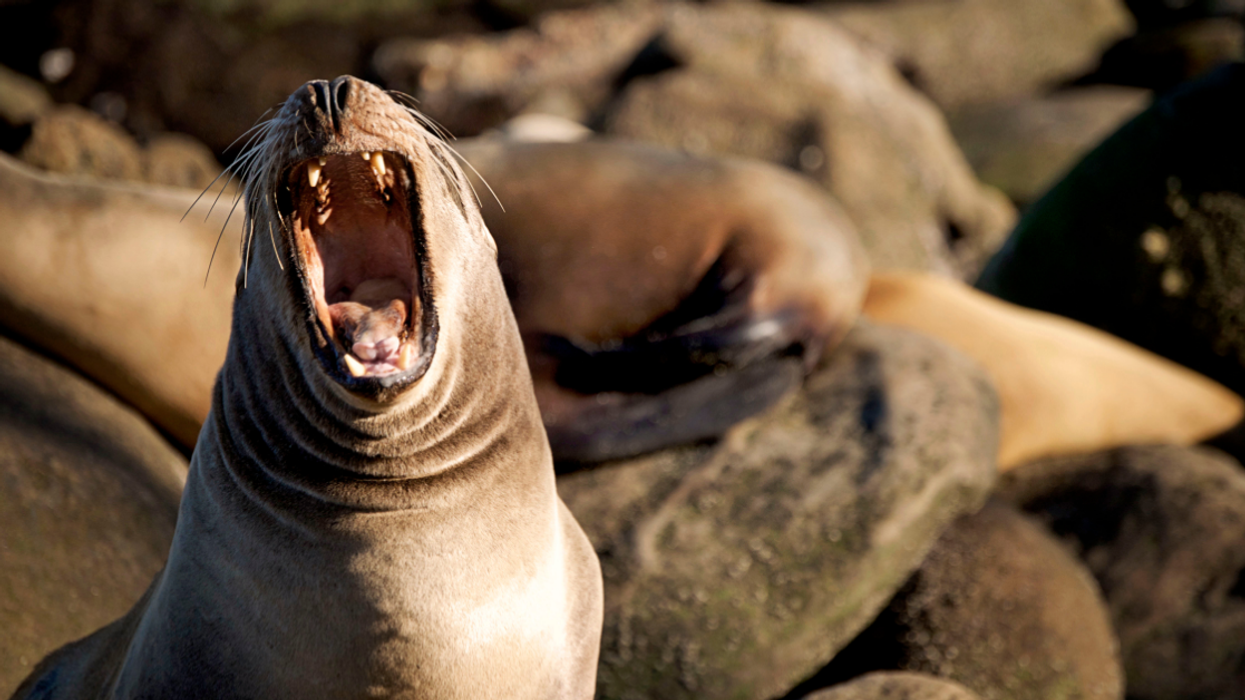There are plenty of dishonest tactics in the arsenal of an internet troll, and learning to recognize them is the first step in learning to deal with (or simply ignore) them.
"Sealioning" (or Sea-lioning) is the practice of badgering a person with seemingly well-intentioned questions and constantly asking for clarification of simple points with the intention of making them react in a negative way.
Oxford's A Dictionary of Social Media defines it as:
"A disparaging term for the confrontational practice of leaping into an online discussion with endless demands for answers and evidence."
The term is largely attributed to an excellent Wondermark comic strip, which can be found HERE.
Wondermark's website allows users to share their comics on Twitter and people have been utilizing "#1062; The Terrible Sea Lion" to call out trolls ever since.
In the strip, a woman is seen saying that she doesn't like sea lions. Suddenly, a sea lion appears and tells the woman it would "like to have a civil conversation about your statement."
It then asks her to produce "evidence of any negative thing any sea lion has ever done to you." It then goes on to repeatedly bother the woman over the next several panels, demanding she produce evidence of her opinion (proving her point for her, really).
This is an excellent example of sealioning: It starts out as what appears to be a good-faith request for discourse, and rapidly becomes something else entirely.
Dr. J. Marshall Shepherd wrote about sealioning in Forbes (as well as an excellent summary of the other forms of dishonest communication he deals with online as a climate scientist).
He asked Dr. Pete Akers, of Géosciences de l'Environnement, Grenoble, about his experience with sealioning:
"people who troll online by pretending to ask sincere questions, but just keep feigning ignorance and repeating 'polite' follow ups until someone gets fed up. That way, they can cast their opponents as attacking them and being unreasonable. It's pretty common on comment sections of weather blogs re: climate change. It's called 'sealioning', and the term is based on this lovely comic (found at this link)."
Amy Johnson wrote about sealioning in an essay for Harvard University's Perspectives on Harmful Speech Online:
"It disguises itself as a sincere attempt to learn and communicate. Sealioning thus works both to exhaust a target's patience, attention, and communicative effort, and to portray the target as unreasonable. While the questions of the "sea lion" may seem innocent, they're intended maliciously and have harmful consequences."
Johnson likens the act of sealioning to a Denial of Service (DoS) attack whereby the attacker prevents communication with a person, rather than a server, by wasting their time and resources.
"Sealioning integrates social and technological manipulation to overload response capacity, tricking people into making an extensive, expensive effort that simultaneously prevents them from engaging elsewhere."
Even if you weren't familiar with the term, you have undoubtedly witnessed sealioning in action if you've read nearly any scientific or political threads on any social media platform.
Quite a few people expressed surprise at learning there was a term for this behavior.
A great response to those who try to sealion:
Sealioning isn't a new tactic, but it is one that not many people are familiar with nor able to recognize.
Effectively recognizing when people are just trying to waste your time or make you react is an excellent way to avoid them, thereby improving your overall internet experience.








 u/pizzaratsfriend/Reddit
u/pizzaratsfriend/Reddit u/Flat_Valuable650/Reddit
u/Flat_Valuable650/Reddit u/ReadyCauliflower8/Reddit
u/ReadyCauliflower8/Reddit u/RealBettyWhite69/Reddit
u/RealBettyWhite69/Reddit u/invisibleshadowalker/Reddit
u/invisibleshadowalker/Reddit u/Wishnik6502/Reddit
u/Wishnik6502/Reddit u/kateastrophic/Reddit
u/kateastrophic/Reddit u/blking/Reddit
u/blking/Reddit u/SlagQueen/Reddit
u/SlagQueen/Reddit u/geezeslice333/Reddit
u/geezeslice333/Reddit u/meertaoxo/Reddit
u/meertaoxo/Reddit u/crystal_clear24/Reddit
u/crystal_clear24/Reddit u/stinkpot_jamjar/Reddit
u/stinkpot_jamjar/Reddit





 u/Bulgingpants/Reddit
u/Bulgingpants/Reddit
 @hackedliving/TikTok
@hackedliving/TikTok @hackedliving/TikTok
@hackedliving/TikTok @hackedliving/TikTok
@hackedliving/TikTok @hackedliving/TikTok
@hackedliving/TikTok @hackedliving/TikTok
@hackedliving/TikTok @hackedliving/TikTok
@hackedliving/TikTok @hackedliving/TikTok
@hackedliving/TikTok @hackedliving/TikTok
@hackedliving/TikTok @hackedliving/TikTok
@hackedliving/TikTok @hackedliving/TikTok
@hackedliving/TikTok
 @vanderjames/Instagram
@vanderjames/Instagram @vanderjames/Instagram
@vanderjames/Instagram @vanderjames/Instagram
@vanderjames/Instagram @vanderjames/Instagram
@vanderjames/Instagram @vanderjames/Instagram
@vanderjames/Instagram @vanderjames/Instagram
@vanderjames/Instagram @vanderjames/Instagram
@vanderjames/Instagram @vanderjames/Instagram
@vanderjames/Instagram @vanderjames/Instagram
@vanderjames/Instagram @vanderjames/Instagram
@vanderjames/Instagram
 Steven Franklin/Facebook
Steven Franklin/Facebook John Gray/Facebook
John Gray/Facebook Jim Regan/Facebook
Jim Regan/Facebook Don Krogol/Facebook
Don Krogol/Facebook Bill Coffee/Facebook
Bill Coffee/Facebook Suzanne Jolly Alexander/Facebook
Suzanne Jolly Alexander/Facebook Bruce Griesmer/Facebook
Bruce Griesmer/Facebook Brian Kenyon/Facebook
Brian Kenyon/Facebook